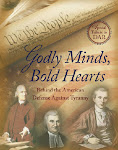

From the late 17th century and on into the middle of the next century, England and France competed for land in the new wilderness of America while the bewildered Indians were disjointed and no match to stop the progress of Pandora. They had laughed at the white man's ignorance and gladly traded land, which was free, for the trinkets* offered. In return, the Europeans had asked to live peaceably in the wilderness territory and offered payment to settle and call the land their own. Little did anyone know how prosperous the country would become under the direction of the American colonists and that it would some day to later generations appear as though the Indians had been cheated.
The English claimed land by virtue of John Cabot but which they had not yet settled. Conflict began when trading posts established and frequented for years by the English were being visited by the French in competition for the Indian furs. Before England's Ohio Company could occupy the disputed territory permanently, the French dispatched their own group of settlers to nail signs on trees and bury French-inscribed plates of lead to identify the land as their own. The trading posts were destroyed, and the English traders were made prisoners. In return, the English raided French farmers and fishermen and deported them to New Orleans.
Virginia's Governor Dinwiddie drew up a formal document in order to file one final diplomatic objection with the French. He would need to send the parchment with someone to see General St. Pierre stationed at Fort Erie in Pennsylvania. Putting together a small party of men to make the wintry 500-mile trek, he selected 21-year old George Washington to act as ambassador. Having made George a major in the Virginia militia two years earlier, Dinwiddie had confidence in the young man's discipline and abilities to overcome obstacles.
The mission given him by Dinwiddie was carried out successfully with George returning alone after 11 weeks--the others stayed behind to hunt and trap the rich wilderness. Ambassador Washington reported that the French were putting together reinforcements and that St. Pierre indicated it would take war to try to dislodge them from the territory.
The English colonists knew how wild and forbidding the trip must have been and admired that George Washington carried out orders so gallantly. His name as a dedicated young patriot became praised throughout the area.
I may point out to the public that heroic youth Colonel Washington, whom I cannot but hope
Providence has hitherto preserved in so signal a manner for some important
service to his country.Reverend
Samuel Davies
It was said that Washington held a great, commanding presence, rivalled only by that of John Witherspoon. He gained admiration just by his carriage and demeanor, and he had an ability to invoke a spirit of confidence in those around him. The star of George Washington rose with great notice surely and steadily day by day. Little known at the time was the fact that George's mother prayed long and often for the soul of his destiny.
The French were busily reinforcing their claim to the disputed land by building Fort Duquesne as a ready defense. Troops were raised in Virginia, and George was made Lieutenant colonel entrusted with a command. When Colonel Washington set out to recapture the site by force, the French were ready. They saw him coming and flew to arms. Their leader Jumonille and ten of his men were killed, twenty-one were made prisoners. Washington returned to a small stockade (Fort Necessity) he had erected in the area and waited for reinforcements. While he waited, he started to clear a path from Fort Necessity to Fort Duquesne. It took a month for reinforcements, but a small group of volunteers from South Carolina showed up.
It was May of 1754 when George Washington set out with a group of about 400 men, including that small group of volunteers, to meet the enemy at Fort Duquesne. After advancing 13 miles, his scouts told him that general De Villiers was approaching with French and Indian fighters, about three times the number of their small army. Washington took his men back to Fort Necessity. As De Villiers surrounded the fort, the Indians found spots amongst the thick foliage of trees while the French fired from tops of the knolls. The battle lasted for nine hours with the French continuously pouring musket balls down upon the fort. The men under Washington seemed tireless, and it was taking longer to win than De Villiers had anticipated. He saw it would take a lot longer unless he offered the English a deal. He told Washington that if they surrendered the land, they would be allowed to go back to Virginia peaceably with all their supplies intact. Having lost 30 of his men, Washington decided it was best to leave rather than risk more lives at such a disadvantage.
The Virginia House of Burgesses voted Colonel Washington a public thanks for handling his men so capably in the face of overhelming odds. The English settlers recognized Washington's bravery; but they were fearful. With so few soldiers, they knew an oncoming war would be their doom. In the meantime, the French continued to ravage and plunder the trading posts and settlements along the inner frontiers.
The French were busily reinforcing their claim to the disputed land by building Fort Duquesne as a ready defense. Troops were raised in Virginia, and George was made Lieutenant colonel entrusted with a command. When Colonel Washington set out to recapture the site by force, the French were ready. They saw him coming and flew to arms. Their leader Jumonille and ten of his men were killed, twenty-one were made prisoners. Washington returned to a small stockade (Fort Necessity) he had erected in the area and waited for reinforcements. While he waited, he started to clear a path from Fort Necessity to Fort Duquesne. It took a month for reinforcements, but a small group of volunteers from South Carolina showed up.
It was May of 1754 when George Washington set out with a group of about 400 men, including that small group of volunteers, to meet the enemy at Fort Duquesne. After advancing 13 miles, his scouts told him that general De Villiers was approaching with French and Indian fighters, about three times the number of their small army. Washington took his men back to Fort Necessity. As De Villiers surrounded the fort, the Indians found spots amongst the thick foliage of trees while the French fired from tops of the knolls. The battle lasted for nine hours with the French continuously pouring musket balls down upon the fort. The men under Washington seemed tireless, and it was taking longer to win than De Villiers had anticipated. He saw it would take a lot longer unless he offered the English a deal. He told Washington that if they surrendered the land, they would be allowed to go back to Virginia peaceably with all their supplies intact. Having lost 30 of his men, Washington decided it was best to leave rather than risk more lives at such a disadvantage.
The Virginia House of Burgesses voted Colonel Washington a public thanks for handling his men so capably in the face of overhelming odds. The English settlers recognized Washington's bravery; but they were fearful. With so few soldiers, they knew an oncoming war would be their doom. In the meantime, the French continued to ravage and plunder the trading posts and settlements along the inner frontiers.
The separate English colonies had not too long before been very isolated from each other with their own interests and distrust of outsiders. The Great Awakening, particularly through the traveling efforts of George Whitefield, had brought them reason for unity. Through faith in God, they realized their similiarities and the strength of charity. Now the common French threat they shared was bringing them closer together in need for cooperation in self-preservation.
Drawn up was a plan of union known as the Albany Plan to include New York, New Hampshire, Massachusetts, Rhode Island, Connecticut, Pennsylvania, Maryland, and Indians of the Six Nations. This agreement professed that its president and council would be able to make purchases of uninhabited lands from the Indians, conduct treaties with Indian nations, regulate trade, and decide when necessary to declare war. For defense purposes, it was understood duties may be imposed in order to raise troops, build forts, and supply armed vessels. This treaty was largely Ben Franklin's idea. It was signed by attending delegates on July 4, 1754, but was rejected by the British Crown and also the colonists, each side thinking the other got too much power.
Franklin is quoted as saying, "I am still of opinion it would have been happy for both sides of the water if it had been adopted. The colonies so united would have been sufficiently strong to have defended themselves, there would then have been no need of troops from England; of course the subsequent pretence for taxing America and the bloody contest it occasioned would have been avoided. But such mistakes are not new; history is full of the errors of states and princes."
When Louis XV sent out a fleet carrying three thousand soldiers to reinforce the French army in Canada, King George III ordered General Edward Braddock to proceed to America with two regiments of English regulars to oust the French. Braddock was a fine General, and he was proud of all his achievements; but now he was over 60 years of age and not looking forward to the prospect of war on the wilds of America with a relatively few men of his own. Just before he left, he wrote his will and gave it to a dear friend. He held the Americans as uncouth and uncivilized, hardly worth the bother of listening to. As he unfolded a map, he complained that he was "going forth to conquer whole worlds with a handful of men, and to do so must cut his way through unknown woods."
In Feb of 1755, the British troops arrived in Virginia. The American colonists were greatly encouraged by the sight, the most beautiful and mighty army in all the world. Many of the colonists were so uplifted by the prowess these men represented, they offered their own services to join them. Braddock was obliged to accept, though with contempt, and figured to find a place for them at the back of his regiment.
He then set about to meet with Governor Dinwiddle and other colonial governors to discuss military strategy. According to plan, the first campaigns were won by the English fairly easily. The fourth and greatest campaign was to be carried out at Fort Duquesne with Braddock in the lead. He had heard much of George Washington and requested his services as an aide in this mission. Washington's mother was afraid and asked him not to go; but he reminded her, "The God to whom you commended me, madam, when I set out upon a more perilous errand, defended me from all harm, and I trust He will do so now. Do not you?"
While waiting for Washington, Braddock had become acquainted with Ben Franklin and found him most polished and well-versed. However, Ben Franklin found himself dancing around the eggshells of Braddock's arrogance as he gently tried to tell him that American warfare might be a little different from what Europeans were used to. Amongst American colonists and Indians, there were no rules of engagement; but Braddock scoffed at American weakness, and the fear of savages did not exist within the ranks of the English military.
When Washington arrived in Alexandra, he was welcomed hardily by Braddock and his two other aides; but an obstacle presented itself when it was found that Virginia did not have enough wagons or horses and saddles and other supplies to outfit an army. Braddock assigned Franklin the task of obtaining horses from the Pennsylvania farmers.
The farmers in Pennsylvania were their own breed. As was the case with other immigrants, they came to America to use their talents and better their lives in freedom, something they could not do anywhere else. They went through many hardships and risks in working the land to finally become prosperous. All their toil and heart and time they poured into the land had paid off. So when Ben Franklin came to them to talk matters of the military, that was something foreign to the nature of life they developed. Franklin understood that. Applying needed pressure, he told them that their loyalty would be seriously questioned if they did not lease wagons and horses with saddles to the British Crown. He encouraged that now is a good time to volunteer and be paid for their goods rather than wait for the Crown to have to seize by necessity. The farmers insisted that Ben back up the promised British gold and silver with his own note so that they could be guaranteed a return on their investment. Poor Ben. Surely, he suspected the possibilities in what he was letting himself in for; but if that was what he had to do, then he did it hoping for the best.
With the wagons and teams now supplied, Braddock set out from Alexandria, Virginia, toward the wilds of Fort Duquesne. An advance party of guides was sent forward, followed by a working party with two hundred and fifty axmen along with tool wagons, two cannons, and rear guard. Braddock and his two aides trailed this detachment with the main body, artillery, and provisions. A body of regulars with the American provincials brought up the rear.
The Battle
Washington said the most beautiful spectacle he ever beheld was when he looked back to see the British troops on the morning of that day in battle (July 9): crimson coats, shining weapons, floating banners, the steady march to the sound of an upbeat war chant. The soldiers were arranged in columns, lined in exact order and total discipline. They had been trained well for stand-up battle. Washington, like Franklin, had earlier warned Braddock that Americans did not fight in any kind of order, but Braddock became enraged that an inferior would try to give him advice.
The French watched them from amidst the trees and thickets as they came into sight with a forward detachment of 350 soldiers and 250 workers and axmen to support them. Braddock and his men were a short distance behind, and another division carrying the heavy supplies were about 40 miles behind them. After calculating how outnumbered they were with their force of 900 against the English 1300, the French knew their best chance was to ambush them by surprise. Their advantage was familiarity with the territory.
As the march continued and the forward detachment crossed a narrow ravine, their guides came running back toward them. An Indian was also running at them and stopped short when he spotted the troops. As soon as the lone Indian waved his hat over his head, an attack came from out of nowhere, blinding the English ranks who were mentally short-circuited and stunned by the unseen muskets. The bullets sprayed furiously from behind trees and rocks, with Indians wildly hooting their loud and hideous noises, while the British fired randomly through the dust, falling one by one. Horses panicked, rearing up and receiving wounds, trampling bodies both living and dead, and dragging wagons behind them. The startled officers never before had encountered such confusion, but they kept a level head trying to control their frenzied men. The axmen fled for their lives while the soldiers tried in desperation to get some control. They were in the open, plainly visible in being fired at with deadly certainty against a foe they couldn't locate.
Upon hearing the intense firing, Braddock rapidly started up the incline toward the ravine; but the first regiment was on the retreat downhill and ran into Braddock's men, mixing the two regiments together and throwing the entire army into disarray. No one was certain where to go or what to do. Men were still being fired at with precision and cluttering the field with the sickness of blood and bodies. The despair of helpless uncertainty made them huddle together looking outward in the midst of the ravine.
The colonists who had joined them found their own trees to hide behind and from which to fire whenever they spotted a moving target. Braddock was appalled by this type of cowardice and ordered them to come out and fight like men of honor. He ordered them into columns according to the rules of English military tactics. Reluctant but forced to join the deadly havoc, they, too, became brightly colored targets easy to pick off.
General Braddock was a lion in battle, fighting ferociously in a contest for life against death. Five horses were shot out from under him, and he kept going with reckless passion. His two aides were wounded, leaving Washington the only aide left to ride over every part of the field carrying the General's orders. Washington was very visible, most certainly an easy target for the French sharpshooters. As a particularly conspicuous mark to the enemy, onlookers expected him to fall any moment; but he kept riding high, to and fro with orders to subordinates, unflinching in the face of duty and disaster. One witness in awe of this unbelievable feat reported, "Nothing but the superintending care of Providence could have saved him." The battle lasted over two hours.
Following the battle, the Indians testified that they had specifically singled Washington out and repeatedly shot at him, but their bullets seemed to disappear without effect. They soon enough became convinced that he was protected by a great spirit. Two horses had been shot from under him; four times his coat had been torn by musket balls; but in the heat of battle and still recovering from a feverish illness, he never noticed. Shielded by God's hand, he was untouched by bullet or bayonet, arrow or tomahawk, even though scores of victims fell around him.
Every mounted officer was slain, except Washington; and when Braddock was wounded, he slumped off his horse to the ground creating a new panic within the troops. Those who could fled to save their lives. Washington now took charge and had Braddock hurried off the blood-bathed field. After the shooting died down, Indians came out from hiding to gather their precious scalps from the dead and wounded. Distracted by the beautiful coats and British weaponry, they had no more interest in the staggering remains of about 200 men trying to struggle back to Virginia.
Triumphant shouts were heard from within the depths of the forest as the Indians returned to Fort Duquesne with scalps and the richness of their plunder. Walking with them were a few prisoners they had found. Colonel James Smith, an English officer captured before the battle, believed the 'infernal regions' must have broken loose as he witnessed the spectacle of the Indians shrieking in boisterous joy.
"About sundown I beheld a small party coming in with about a dozen prisoners,
stripped naked, with their hands tied behind their backs. Their faces, and parts
of their bodies were blackened. These prisoners they burned to death on the
banks of the Allegheny river, opposite to the fort. I stood on the fort walls
until I beheld them begin to burn one of these men. They tied him to a stake and
kept touching him with fire-brands, red-hot irons, etc., and he screaming in the
most doleful manner. The Indians, in the meantime, were yelling like infrnal
spirits. As this scene was too shocking for me to behold, I returned to my
lodgings, both sorry and sore."
Aftermath events:
--Washington wrote to his mother on July 18. In part, the letter read:
--One famous Indian warrior who was a leader in the attack was often heard to testify, "Washington was never born to be killed by a bullet. I had seventeen fair fires at him with my rifle, and after all could not bring him to the ground."--Washington wrote to his mother on July 18. In part, the letter read:
Honored Madam:
As I doubt not but you have heard of our defeat, and perhaps
had it represented in a worse light, if possible than it deserves, I have taken
this earliest opportunity to give you some account of the engagement as it
happened......The Virginia troops showed a good deal of bravery and were nearly
all killed; for I believe out of three companies that were there, scarcely
thirty men are left alive. Captain Peyrouny and all his officers down to a
corporal were killed.
Captain Polson had nearly as hard a fate, for only one
of his was left. In short, the dastardly behavior of those they call regulars
exposed all others that were inclined to do their duty to almost certain death;
and, at last, in spite of all the efforts of the officers to the contrary, they
ran as sheep pursued by dogs and it was impossible to rally them.
The General was wounded, of which he died three days after. Sir Peter Halkett was
killed in the field, where died many other brave officers. I luckily escaped
without a wound, though I had four bullets through my coat and two horses shot
under me. Captains Orme and Morris, two of the aids-de-camp, were wounded early
in the engagement, which rendered the duty harder upon me as I was the only
person then left to distribute the General's orders, which I was scarcely able
to do as I was not half recovered from a violent illenss that had confined me to
my bed and a wagon for above ten days. I am still in a weak and feeble
condition, which induces me to halt here two or three days in the hope of
recovering a little strength to enable me to proceed homewards; from whence, I fear, I shall not be able to stir till toward September...
--Mary Draper Ingels, kidnapped from her home on July 8, 1755, by a band of Shawnee Indians, relates the incident in her biography after a midwinter escape from her captors. She recounts that one day during her captivity the French were talking excitedly to each other. Mary listened to their conversation when she heard George Washington's name. Having personally met Washington, she was curious and inquired about the conversation. She learned the account of Indian Chief Red Hawk who had been in the victory at Duquesne. Red Hawk told of shooting eleven different times at Washington without killing him. He knew there was a Great Spirit protecting him at that point because his gun had never before missed its mark. Out of respect for the Spirit's wishes, he ceased firing at him. When she heard the story about the battle and its grizzly outcome, she doubted the account because surely the mighty British could not have been so completely crushed. After her return to cilization she told what she had heard and was assured that the account was indeed accurate.
--Fifteen years after the battle, Washington and a good friend were exploring uninhabited regions near what is now Ohio and West Virginia. A company of Indians, led by an old chief approached them. They had heard Washington was coming to that part of the country, and so he set out on a long journey to find him. It was important to him to relate:
I am chief and ruler over my tribes. My influence extends to the waters of the
great lakes and to the far blue mountains. I have traveled a long and weary path
that I might see the young warrior of the great battle. It was on the day when
the white man's blood mixed with the streams of our forest that I first beheld
this chief. (Washington) I called to my youhg men and said, 'mark you tall and
daring warrior? He is not of the red-coat tribe--he hath an Indian's wisdom, and
his warriors fight as we do -- himself is alone exposed. Quick, let your aim be
certain, and he dies.' Our rifles were leveled, rifles which, but for you, knew
not how to miss--'twas all in vain; a power mightier far than we shielded you.
Seeing you were under the special guardianship of the Great Spirit, we
immediately ceased to fire at you. I am old and soon shall be gathered to the
great council fire of my fathers in the land of shades, but ere I go, there is
something bids me speak in the voice of prophecy. Listen. The Great Spirit
protects that man, (Washington) and guides his destinies--he will become the
chief of nations, and a people yet unborn will hail him as the founder of a
mighty empire. I am come to pay homage to the man who is the particular favorite
of Heaven and who can never die in battle.
--Eighty years after the battle at Monongahela, a gold seal of Washington, containing his initials, was found on the battlefield. It had been shot off him by a bullet. That gold seal is now in the possession of his family.
*Trinkets: "blankets, kettles, steel axes, knives, and perhaps guns - goods American Indians valued highly and would go to great lengths to obtain..." http://www.worldfreeinternet.us/AmericanHolocaust/stealing.htm





















































































1 comment:
George Washington was indeed special.
About the Indians: It occurs to me that if over the centuries Indians would have spent less time warring with each other and collecting scalps, they might have created their own special trinkets and not been so eager to trade land for the strange inventions of Western civilization. What we view as trinkets today were considered luxuries back then.
Also, if they spent less time killing each other off, perhaps they wouldn't have been so interested in kidnapping white women.
Post a Comment